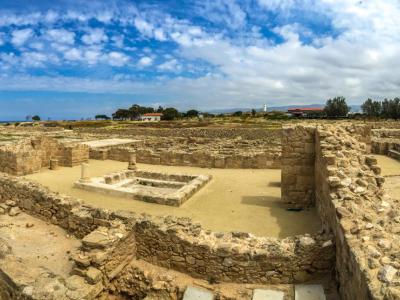Nea Paphos Archaeological Park, Paphos (must see)
Paphos Archaeological Park, also known as Kato Pafos Archaeological Park, encompasses a significant portion of the ancient Greek and Roman city of Paphos and continues to be a site of ongoing excavation, offering a remarkable journey through time.
Within the park's boundaries, visitors can explore a diverse range of sites and monuments that span from prehistoric periods to the Middle Ages. Among the most prominent and well-preserved discoveries are four grand Roman villas: the House of Dionysos, the House of Aion, the House of Theseus, and the House of Orpheus. These villas boast exquisite mosaic floors, with the Orpheus mosaic being a particularly breathtaking example of ancient artistry.
The archaeological explorations have also revealed an agora (a central public space), an asklipieion (a healing temple), a basilica, an odeion (a small theater), a Hellenistic-Roman theater, and a necropolis recognized as the "Tombs of the Kings."
Nea Paphos, situated within the Paphos Archaeological Park, forms an integral part of the Paphos archaeological complex inscribed on the UNESCO World Heritage List. This recognition was bestowed upon the complex in 1980 in acknowledgment of its exceptional mosaics, ancient remnants, and historical religious significance.
Historically, Nea Paphos is believed to have been established by Nicocles, the final king of Paphos, towards the close of the 4th century BC. It subsequently became the island's capital at the beginning of the 2nd century BC during the Hellenistic period under the rule of the Ptolemies, supplanting Salamis as the capital.
In 1965, archaeological excavations were initiated under the guidance of Prof. Kazimierz Michałowski, conducted by the Polish Centre of Mediterranean Archaeology at the University of Warsaw. The excavations uncovered remarkable finds, including marble statues of Asclepius and Artemis, both significant deities worshipped in the city. Additionally, a treasure trove of silver coins from the reigns of Philip III of Macedon and Alexander the Great was brought to light.
Within the park's boundaries, visitors can explore a diverse range of sites and monuments that span from prehistoric periods to the Middle Ages. Among the most prominent and well-preserved discoveries are four grand Roman villas: the House of Dionysos, the House of Aion, the House of Theseus, and the House of Orpheus. These villas boast exquisite mosaic floors, with the Orpheus mosaic being a particularly breathtaking example of ancient artistry.
The archaeological explorations have also revealed an agora (a central public space), an asklipieion (a healing temple), a basilica, an odeion (a small theater), a Hellenistic-Roman theater, and a necropolis recognized as the "Tombs of the Kings."
Nea Paphos, situated within the Paphos Archaeological Park, forms an integral part of the Paphos archaeological complex inscribed on the UNESCO World Heritage List. This recognition was bestowed upon the complex in 1980 in acknowledgment of its exceptional mosaics, ancient remnants, and historical religious significance.
Historically, Nea Paphos is believed to have been established by Nicocles, the final king of Paphos, towards the close of the 4th century BC. It subsequently became the island's capital at the beginning of the 2nd century BC during the Hellenistic period under the rule of the Ptolemies, supplanting Salamis as the capital.
In 1965, archaeological excavations were initiated under the guidance of Prof. Kazimierz Michałowski, conducted by the Polish Centre of Mediterranean Archaeology at the University of Warsaw. The excavations uncovered remarkable finds, including marble statues of Asclepius and Artemis, both significant deities worshipped in the city. Additionally, a treasure trove of silver coins from the reigns of Philip III of Macedon and Alexander the Great was brought to light.
Want to visit this sight? Check out these Self-Guided Walking Tours in Paphos. Alternatively, you can download the mobile app "GPSmyCity: Walks in 1K+ Cities" from Apple App Store or Google Play Store. The app turns your mobile device to a personal tour guide and it works offline, so no data plan is needed when traveling abroad.
Nea Paphos Archaeological Park on Map
Sight Name: Nea Paphos Archaeological Park
Sight Location: Paphos, Cyprus (See walking tours in Paphos)
Sight Type: Attraction/Landmark
Guide(s) Containing This Sight:
Sight Location: Paphos, Cyprus (See walking tours in Paphos)
Sight Type: Attraction/Landmark
Guide(s) Containing This Sight:
Walking Tours in Paphos, Cyprus
Create Your Own Walk in Paphos
Creating your own self-guided walk in Paphos is easy and fun. Choose the city attractions that you want to see and a walk route map will be created just for you. You can even set your hotel as the start point of the walk.
Paphos Introduction Walking Tour
For most people, the mesmerizing town of Paphos on the southwestern coast of Cyprus is all about sun, sand, and sea. However, alongside its beachy vibes, this seaside resort is home to a swag of important historical tourist attractions that contributed to Paphos being anointed European Capital of Culture in 2017.
Indeed, as a UNESCO World Heritage-listed city, Paphos is steeped in both... view more
Tour Duration: 2 Hour(s)
Travel Distance: 4.1 Km or 2.5 Miles
Indeed, as a UNESCO World Heritage-listed city, Paphos is steeped in both... view more
Tour Duration: 2 Hour(s)
Travel Distance: 4.1 Km or 2.5 Miles
Paphos Archaeological Park Walking Tour
Paphos is divided into two parts. Kato Paphos, the area near the harbor, is where all the archaeological sites are located, while Ktima (Old Town) is where you'll find the museums. The Archaeological Park of Kato Paphos has been included in the UNESCO World Heritage Sites list since 1980.
This park includes sites and monuments from the 4th century BC to the Middle Ages, while most remains... view more
Tour Duration: 1 Hour(s)
Travel Distance: 2.0 Km or 1.2 Miles
This park includes sites and monuments from the 4th century BC to the Middle Ages, while most remains... view more
Tour Duration: 1 Hour(s)
Travel Distance: 2.0 Km or 1.2 Miles





